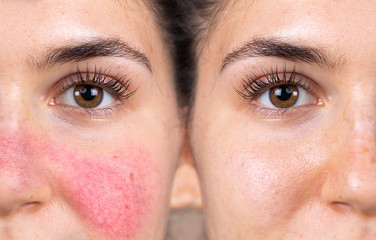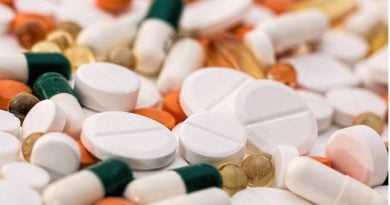An Expert Guide To Rosacea Treatment
Do you experience redness in the face, which makes you ask, “Is there a dependable dermatologist near me to help me deal with this skin problem?”
You could be suffering from a chronic skin disorder known as rosacea. It typically causes redness on the face as well as lesions that resemble pimples that can be found on the nose, chin, forehead, and/or cheeks. People with rosacea tend to flush easily at the onset of the condition. It is mild at first that you may not even bother with it. If left untreated, you may start dealing with persistent redness in the centre of your face, and it could get worse over time. Rosacea does not normally resolve itself without proper treatment and the condition may persist for years.
Anyone may develop rosacea, although this condition is most typical among middle-aged, fair-skinned women. Their light skin makes the redness more obvious.
Unfortunately, there is no known cure for rosacea, but it can be controlled effectively by preventing the triggers via lifestyle changes and medical treatment. It is also possible to prevent the worsening of rosacea.
Contents
Who is at risk?
There are many risk factors for rosacea. Rosacea may affect women and men of all ages, including children. It commonly develops over a long period. It is still unclear why women develop rosacea more often than men. Some cases have something to do with menopause.
Rosacea Symptoms that You Need to Know
The following are the signs and symptoms of rosacea that you need to know:
Enlarged nose
Some people with rosacea may find the skin of their nose becoming thick. It makes the nose look bulbous. Men usually suffer from such occurrences more than women.
Red eyes and other eye problems
Many people who suffer from rosacea also experience different eye problems, which include swollen eyelids, red and swollen eyes, dryness, and irritation. To be specific, ocular rosacea is the one that’s causing the problems to the eye. Some people experience eye symptoms first followed by skin symptoms.
Red, inflamed bumps
Many people suffering from rosacea also have pimples that look like acne. The bumps may contain pus. If you have this kind of condition, you may feel a tender and burning sensation on your skin.
Redness of the Face
Unrelenting redness of the face usually comes with having rosacea. When you have rosacea, the small blood vessels of your cheeks and nose often swell and become noticeable. It is hard to miss, especially if you are fair-skinned.
How Your Doctor can Tell that You Have Rosacea
To be frank, there’s no specific test that can be done to determine whether you have rosacea. Your doctor will depend on the information that you will provide regarding the history of your symptoms. He will examine your skin for the symptoms of rosacea.
You may still need to undergo certain tests. But, you are only taking these tests to rule out other possible conditions that you may have, such as lupus, eczema, or psoriasis. The said conditions also show signs and symptoms that are the same as the ones that rosacea is showing.
Rosacea Treatment
The main focus of rosacea treatment is controlling the symptoms and signs of the said condition. In most cases, it involves a combination of the right prescription drugs and proper skincare. There are certain factors that your doctor needs to determine before he can prescribe the right medication for you to take. That being said, the medication that your friend takes may not work for you and vice versa.
The duration of the treatment will depend on the severity and type of signs and symptoms. You may expect that the condition to recur again that’s why you need to continue your good skincare regimen.
Rosacea Medications
In recent years, new medications for rosacea have been created. Your doctor will prescribe the type of medication that can suppress your signs and symptoms. You may need to undergo some trial and error, which should be under your doctor’s supervision, to find out the best treatment that works for you. You may need to take a combination of drugs that your doctor will prescribe.
The usual prescription drugs for treating rosacea include the following:
Topical Drugs
Topical drugs can lessen the redness of your face. There’s a cream or gel that you can apply directly to the affected area. The doctor commonly prescribes this for patients with mild to moderate cases of rosacea. There’s also oxymetazoline (Rhofade) and brimonidine (Mirvaso), which can constrict the blood vessels to reduce redness.
You may see visible results after 12 hours from the time you have used the medications that your doctor prescribed. However, it only yields a temporary effect on the blood vessels. You need to apply the medications regularly to ensure that the condition will not get worse.
Some topical products can help keep the pimples of mild rosacea at bay but don’t provide the efficacy, which you expect to see in controlling redness. These drugs include ivermectin (Soolantra), metronidazole (Noritate, Metrogel, and others), and azelaic acid (Finacea, Azelex).
Metronidazole and azelaic acid usually yield noticeable improvements after two to six weeks of use. Ivermectin may take longer than that.
Oral Antibiotics
Oral antibiotics, such as doxycycline (Oracea and others), can help you deal with moderate to severe rosacea that has pimples and bumps. You need to take the antibiotics as prescribed by your doctor.
Oral Acne Drugs
Your doctor may prescribe isotretinoin (Claravis, Amnesteem, and others) if you have severe rosacea and other therapies don’t work. The powerful oral acne drug can help clear up rosacea’s acne-like lesions. Pregnant women should avoid this drug.
If you show symptoms in your eyes, your doctor may require you to consult an eye specialist or ophthalmologist first for proper evaluation.
Remember not to self-medicate to avoid complications.
When to See a Doctor
If the redness on your face does not show any signs that it will go away any time soon, you need to see a skin specialist or dermatologist and obtain a proper diagnosis. Your doctor will recommend treatment and medications for you to take.
Home Remedies and Lifestyle
You can employ the following self-care practice to help control your rosacea and prevent flare-ups:
- Identify the things or the triggers that cause the flare-ups and avoid them at all costs.
- Apply the suitable sunscreen each day to protect your face. Use a sunscreen that can effectively block ultraviolet A and ultraviolet B. Choose a sunscreen with SPF 30 or above. Put on your sunscreen after you apply the prescribed topical medication on your face.
- Wear a hat to avoid the scorching sun when you go out. During cold, windy days, wear a ski mask or scarf. Wear the things that can help you protect your skin against harsh weather or conditions.
- Treat and handle your skin gently. Don’t touch or rub your face too much, and avoid using cleansing and moisturizing products that contain harsh chemicals.




